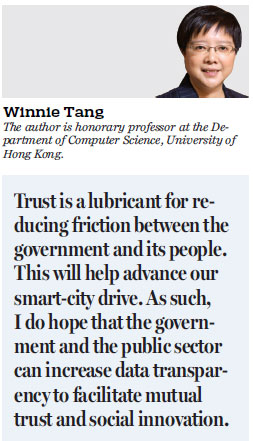Data transparency promotes trust between public and authorities
Updated: 2018-05-21 06:25
(HK Edition)
|
|||||||
The smart lamppost project, an important pilot program of the smart city development in Hong Kong, will collect a lot of data such as on air pollution and traffic. However, public concern over their privacy being intruded on has recently been heightened by Facebook's leakage of customer data. How can the government gain the trust of people? I think enhancing transparency and opening the data related to people's everyday activities will certainly help. The past experiences from both local and overseas events tell us transparency can not only reduce bias but also help facilitate rational public discussion.
Increasing data transparency will improve people's confidence in the government. Chicago, one of the largest cities in the United States, plans to install 500 real-time environmental data collection boxes with sensors and cameras on lampposts by the end of this year. The project "Array of Things" will collect data such as air quality, weather conditions, magnetic fields, noise levels and traffic.

The University of Chicago initiated the project but every group in society - including the public, researchers, private companies and the government - can submit proposals. Once the plan is approved, the data will be collected free of charge and made available to the public. It is expected to promote innovative applications, apart from serving as a research instrument.
As the project will collect public data and images, privacy concerns have been aroused. For example, one application is to understand the interaction of cars, bicycles and pedestrians at road intersections to resolve conflicts among the three parties. People worried that roadside video cameras would also record their images.
So instead of capturing video, the cameras only recorded one or two still images per second. At the same time, the microcomputer in the lamppost box would only extract data according to the researcher's pre-defined requirements - for example the number of cars, heavy trucks and pedestrians passing through the intersection. After extracting the data, the computer would automatically delete images within minutes. Besides, the cameras are limited in the level of detail they can capture, ensuring researchers cannot obtain information such as license plates or human faces, protecting the privacy of the public.
Increasing transparency can also help reduce discrimination and bias, as pointed out by two Oxford University scholars. In their article exploring the potential impact of the European Union's new General Data Protection Regulation (GDPR) they pointed out that many machine-learning algorithms in artificial intelligence are "black box" operations, but the impact can be large, such as cases involving personal credit, criminal tendency, or can be small as in surveys on interest in new products. Once GDPR is enacted from May 25, it requires all EU countries to authorize the users to obtain their own personal data already collected for free, and to request removal or transfer of their data to other organizations. Users may also request organizations to provide an explanation of the assumptions of algorithms if they suspect they have been treated in an unfair manner.
Government and public organizations might worry that opening data to the public would undermine their authority. But the Hong Kong Observatory's 20 years' experience of opening data shows that high data transparency helps reduce the public's suspicion, and thus enhances mutual trust between the organization and the public.
According to former HKO director Lam Chiu-ying, with the intensive flow of global information in the 1990s, people in Hong Kong established an underground observatory with rich information that attracted many fans. The HKO was inspired and decided to set up its own website in 1996, which has been a great success with its content continuously enriched since then.
By 2016, the HKO website traffic reached 100 billion pages, equivalent to 40 inquiries per day by each person in Hong Kong. The website is cost effective in that each inquiry costs the organization only 0.3 cents.
With all data open to the public, "The citizens would not criticize the HKO for hiding facts. This greatly decreased the public's dissatisfaction and mistrust, resulting in rational interaction between the HKO and the public," Lam concluded.
Trust is a lubricant for reducing friction between the government and its people. This will help advance our smart-city drive. As such, I do hope that the government and the public sector can increase data transparency to facilitate mutual trust and social innovation.
(HK Edition 05/21/2018 page10)